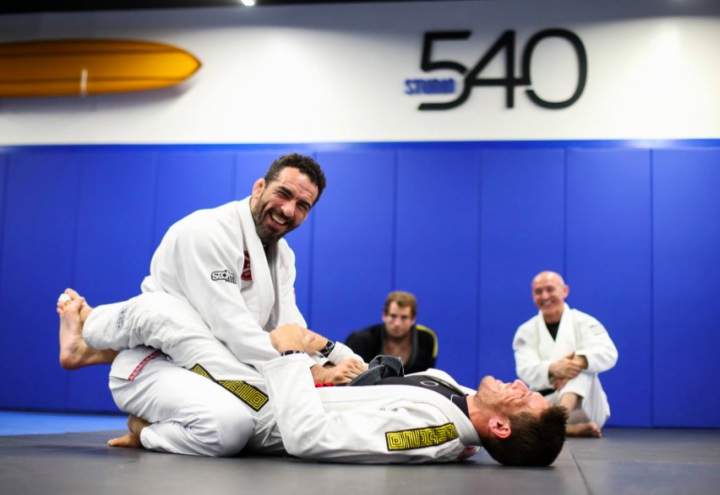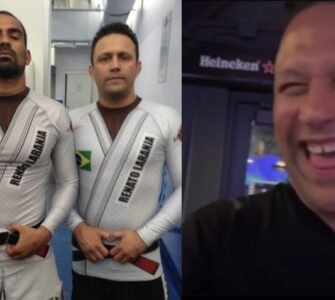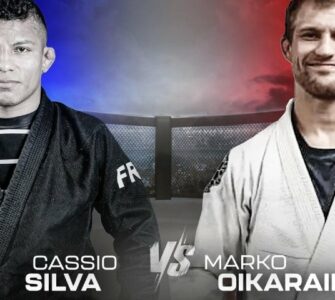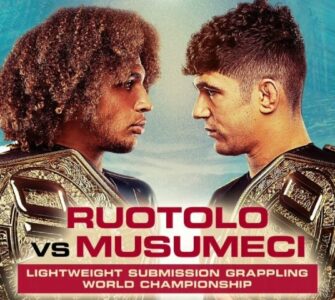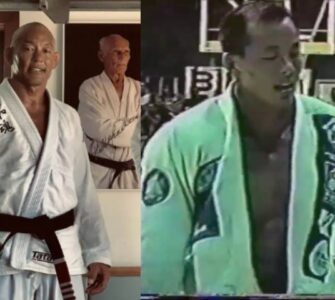Photo: Leon Sandoval www.heyleon.com, Instagram @heyleonmedia and Facebook.com/heyleonmedia
We sat on the red and black Dolamur mats in a loose semicircle. Most of us were chatting, laughing casually in clusters, stretching, until professor Kyle Watson inconspicuously wandered into the central position. Recognizing him we stopped talking and waited for him to open class by choosing his uke and introducing the day’s warm-up.
Today professor Watson stood there silently, facing us, carefully tying his black belt. He looked deep in serious thought. Planning the lesson? We sat attentive for a few long seconds. He looked up, surveyed the room and opened the class in this way, “What did Ernie say when Bert asked him if he wanted ice cream?” He paused, smiled, then answered his own question, “Sher Bert.”
Some of us laughed and some smiled at the dry humor. Professor Watson then chose his uke and began introducing the warm-up, over/under pressure passing.
Why open a Brazilian Jiu Jitsu (BJJ) class with a pun? The instructor had a captive audience and he chose to open with a Sesame Street pun. Yet, research shows that the pun is one of the most effective ways of using humor in the classroom. A study conducted at John’s Hopkins University concluded that opening jokes (puns in particular) were considered #3 in the top ten list of effective uses of humor in the classroom (#4 was “humorous stories” followed by #5 “spontaneous humor”).
While a pun may be a simple form of humor, the effect of the pun reinforces an important cognitive skill, critical thinking, as the brain contemplates the multiple potential meanings of the word, in this case the phonetic play on accent in Ernie’s reply “Sure, Bert.” and the frozen treat “sherbet.”
The purpose of this article is to explore what empirical research and experience tell us about the role of humor in a BJJ academy.
In preparing this article I had the opportunity to sit down with BJJ black belt instructor, author of the BJJ Roadmap, and owner of http://www.grapplearts.com/, and star of German Jiu-Jitsu, Better than Brazilian Jiu-Jitsu Stephan Kesting to discuss humor in BJJ. Kesting offered this observation regarding the irony of training a martial art in the 21st century,
There are many benefits to training in the martial arts and BJJ is probably the best, but ultimately if self-protection is your goal you’d carry a gun and you’d carry knives, you’d know a few moves but you’d spend most of your time on the shooting range and you’d wear body armor. Spending all your time rolling around with men in pajamas is a little silly and we can recognize that irony and that is ok.
If good teaching is good business, it pays to ask, what does research say about how humor effects teaching and learning? One position suggests that humor encourages participation through engagement in the form of laughing together. Laughing together expresses shared values and mutual recognition of irony.
Values have been communicated through humorous anecdotes throughout history in the form of fables because humorous stories communicate on multiple levels to multiple audiences. Kesting elaborated on the effect of storytelling on students learning BJJ,
Humor is storytelling. If you can present learning as a story it gives students context and demonstrates and emphasizes the point you want to make. Stories break people out of complacency and if you can illustrate a learning experience as a humorous story that is even better because it breaks down that hierarchy always creeping into the BJJ academy and it models learning saying, ‘once upon a time I learned a new way to do a leg lock.’ These stories illustrate the learning process by saying ‘here is how I learned, here is how I’m learning, here is how you will likely learn’.
Humorous stories make learning interesting and add depth. Interest and deep learning need regular maintenance in a sport like BJJ. Studying BJJ requires a high tolerance for repetition and a commitment to a long and steep learning curve. In an article published in the Journal of Higher Education, the authors observed that when humor is used in instruction it has the power to both maintain interest and encourage deep learning in students.
Boredom has been cited as one of the most significant barriers to learning and student retention. Humor is an easy way to keep learning fun. Kesting remarked on this, adding,
The brain is a super high use and energy intensive organ, it consumes a lot of calories, it is working all the time, as an instructor you are always battling people zoning out, you are doing battle for brain bandwidth. In a cerebral sport like BJJ where students are listening to and trying to understand complex instructions all the time, comic relief can be very useful for students. If you can wake them up out of the training-induced mental fog then they will learn better and enjoy training more. Remember, BJJ is optional, it is discretionary, you come back for all kinds of reasons, social, physical, intellectual and if the instructor finds ways to use humor, that is one more reason for students to come back and continue to reap the benefits of the art.
Research agrees, “Humorous breaks during a lesson can allow the brain to take a breather, so that it can more effectively process and integrate the information.” Humor not only counters boredom but increases comprehension, understanding and interaction as well.
Studies have shown humor increases positive interaction between students and instructors. In a BJJ class where instructor-student interactions are held at a premium, humor is an egalitarian approach to including everyone in an interactive way. Humor establishes professional relationships between instructors and students by “breaking the ice, reducing fear and tension, and revealing humanness.” “Humor can bridge the gap between the teacher and the students by putting students at ease.” Kesting reflected, “A sense of humor also undermines the most disconcerting aspect of the martial arts, the strict hierarchical structure of the classroom which separates students from teachers. Humor diffuses that, it puts things in perspective.” Students who are at ease listen more closely, follow directions better and apply lessons quicker and more precisely.
Leading humor researchers (Nilsen& Nilsen,2000; Nilsen, 1993) acknowledge that the psychological function of humor is to test limits, that humor has an educational function within teaching and learning, and that the social function of humor is to promote social change. In this sense, humor can be described as subversive; that is, ‘it aims to disrupt our assumptions, emotions, patterns of thinking, ways of knowing and the world as we know it’ (Klein, 2007, p. 132).
Humor is also an integral part of creating a healthy, open learning environment. In a BJJ school where the professor’s expertise creates distance, breaking down barriers and closing gaps becomes crucial for growth and trust. Humor is a great way of saying, “Sure, I may be more experienced in BJJ than you, but we all share some common values and really that is more important.”
Humor has been shown to alleviate pain and discomfort.
Humor can also be used as an effective classroom management tool, tactfully addressing tardiness or disruptions without confrontation.
On a more abstract level, using humor shows an understanding of and appreciation for “the potential … [of] dynamic chaos.” Understanding the value of dynamic chaos is essential to learning BJJ. As a tool for exploring the potential of dynamic chaos humor has the power to disrupt accepted patterns of thinking, an essential skill for any artist. Kesting remarked on this adding,
Humor interrupts the everyday, it jumps out at you, humor activates that part of the brain that is different, not being used, and in that way humor can drive home a lesson. This is the principle of ‘pattern interrupts in neuroscience;’ humor can get something to jump out at you and in a BJJ class where everything can look the same to the novice that is important for both teachers and students.
“Humor pushes students to connect classroom material to new situations.” By using humor in a BJJ class an instructor gets the opportunity to draw connections between the classroom and the wider world.
Research shows that instructors and students who take themselves lightly and are able to laugh at themselves are more self-forgiving for mistakes or blunders that might otherwise cause major embarrassment. In a BJJ class where the art is expressed through performance and everyone is making mistakes and blunders on a regular basis, humor is one of a number of ways of reassuring students.
Seeing an instructor capitalize on humor and make meaning of an opportunity reduces a student’s fear of risk and increases their willingness to take chances. “Using humor can encourage students to take risks despite incurring temporary academic setbacks; therefore, students are able to further engage in the learning process.”
The pun professor Watson opened with could have distracted students or reduced effort, but the research on the subject indicates the exact opposite effect. Not only does an instructor’s use of humor increase students’ attentiveness, but humor also boosts students’ self-confidence in the subject matter, and makes them work harder. Students are more likely to attend class, pay attention, and ultimately learn more from high humor instructors than from low humor instructors.
How can humor be integrated into BJJ instruction? The instructors who use humor effectively seem to take advantage of opportunistic humor, use humor like a wrist lock, not hunting for it, but paying attention for opportunities to capitalize on it.
Kesting offered this as a final thought, “Humor does not mean you don’t train hard, you can train your ass off and workout hard and still laugh about it all.” Given what research and experience tell us laughing about it all may be a crucial part of understanding it all.
About the Author: David Cormier, PhD, is an adjunct professor of English at Saint Louis University (SLU), a private Jesuit institution in St. Louis, Missouri, USA, he is a karate instructor for the SLU Karate Club in the Cheezic Tang Soo Do Federation under Grandmaster Robert Cheezic and a BJJ student at Watson Martial Arts in St. Louis, Missouri, USA, under professor Kyle Watson.
E-mail questions or comments to David Cormier at cormierd@slu.edu, follow on Twitter @david_h_cormier

